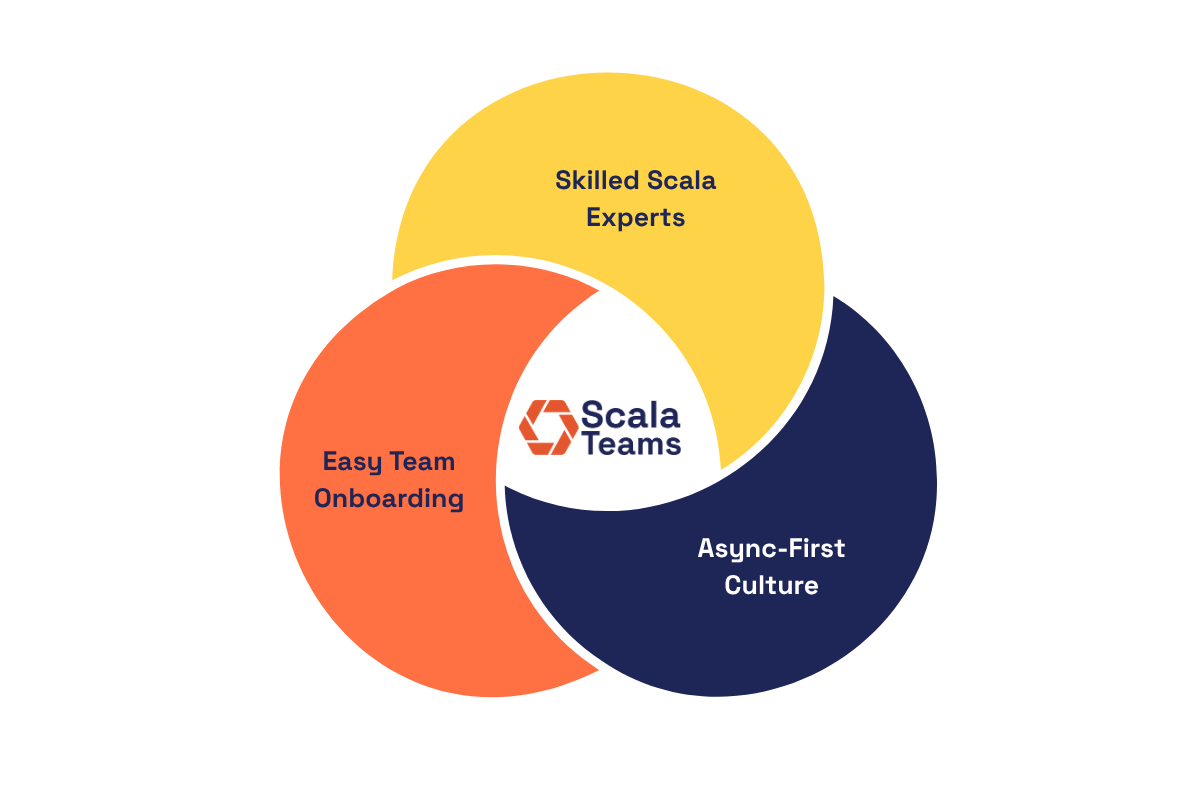How to Overcome the Shortage of Experienced Scala Developers
Finding and hiring experienced Scala developers has never been easy. Scala is a powerful, niche, and high demand development language across industries like fintech, data, and AI. Companies that are looking to hire Scala engineers often run into the same blockers: the talent pool is smaller than Java or Python, and onboarding new hires can consume senior engineers’ time until they’re working nights and weekends just to keep projects moving.
If you’re feeling this way, you’re not alone. Let’s look at why Scala onboarding is so painful and how you can build strategies to scale without burning out your team.
Is Scala Expertise Hard to Find Compared to Java and Python?
Unlike general-purpose languages such as JavaScript or Python, Scala sits in a highly specialized niche. Its strengths like functional programming, type safety, and JVM compatibility attract companies building complex backends, distributed systems, and data platforms. But the flip side is scarcity.
Fewer candidates per role: Scala adoption is growing, but the developer pool is small compared to mainstream languages.
Higher competition for talent: Financial firms, ad tech, and AI startups compete for the same engineers.
Retention challenges: Once you train someone up, another company may swoop in with a higher offer.
The result? Companies either struggle to find qualified Scala engineers or look into offshore options to increase the pool but then get stuck in an endless onboarding cycle.
The Cost of Painful Onboarding
Sometimes, offshore Scala developers bring new challenges. Even when you find motivated Scala engineers, getting them productive can take longer than expected. Here’s why onboarding often drags:
Time zones slow everything down: If you hire junior devs in another hemisphere and they hit a blocker, your senior engineer might be asleep. That delay multiplies over weeks.
Knowledge isn’t codified: Too many teams rely on oral tradition or “just ask me” knowledge sharing. Without Scala-specific onboarding materials, juniors spin their wheels.
Senior engineers burn out: Instead of writing production code, they spend hours explaining why a monad transformer matters or debugging an Akka actor gone wrong.
Async isn’t built-in: If processes depend on real-time answers, your global team stalls.
Onboarding friction slows delivery and risks pushing your best engineers out the door.
Best Practices for Onboarding Scala Developers Globally
The good news? You don’t need to accept 24/7 hand-holding as the price of scaling. A few key practices make onboarding smoother, whether you’re hiring locally or offshore.
1. Build a Scala Onboarding Playbook
Don’t rely on scattered documentation sources. Create a structured playbook covering:
Setup steps for local development environments.
Key libraries and frameworks (Cats, ZIO, Akka, Play).
Common coding patterns and “how we do things here.”
Architectural diagrams with clear ownership boundaries.
A strong playbook cuts onboarding time and reduces repeated questions.
2. Govern the Codebase, Not Just the People
If you want to hire a Scala agency that can learn fast without constant babysitting, let the codebase teach them. Use:
Strict linting and style guides: Enforce consistency automatically.
Pre-commit hooks and CI checks: Catch mistakes early.
Well-defined review standards: Reviews should be teaching moments, not firefighting.
This way, your company can focus on mentoring instead of cleaning up after every commit.
3. Design for Asynchronous Work
Assume your team won’t be online at the same time. Structure processes to support async collaboration:
Encourage detailed GitHub issues with reproducible examples.
Use Loom or recorded walkthroughs instead of repeating meetings.
Track work in Linear, Jira, or similar tools for clear visibility.
When async is the default, time zones stop being a blocker.
4. Augment With Specialized Scala Teams
Instead of hiring a random global pool of juniors, look for engineers who already know Scala. A Scala focused agency can:
Ramp up without draining your seniors.
Embed into your workflows with minimal friction.
Ship production-quality Scala code from day one.
How Scala Teams Helps You Scale Without Burnout
At Scala Teams, we’ve seen this problem from both sides: companies who need specialized Scala talent, and senior engineers exhausted by constant onboarding. That’s why our approach is different.
Skilled Scala experts: Every engineer is experienced with functional programming, Scala 3, and frameworks like Akka, ZIO, and Play.
Async-first culture: We’re built to work across time zones without forcing your team into 24/7 availability.
Plug-and-play onboarding: Our engineers arrive ready to integrate, not to be trained from scratch.
Instead of pulling your tech leads into another late-night debugging call, we help you accelerate your projects.
Scale Your Scala Team Without the 24/7 Burden
The shortage of experienced Scala developers is real, but burning out your senior engineers isn’t the solution. With the right onboarding practices, structured playbooks, codebase governance, async processes, and the right partners, you can build a team that scales sustainably.
If you’re ready to grow your Scala capacity without the overhead, schedule a call with Scala Teams today.
Hiring and Onboarding Scala Developers FAQ
-
Scala is a niche language with a smaller talent pool than Java or Python. Most experienced engineers are already in high demand for complex roles in finance, data, and AI.
-
Use a structured onboarding playbook, enforce codebase governance (linting, CI checks, review standards), and build processes designed for async work across time zones.
-
Time zone differences, lack of documentation, reliance on senior engineers for hand-holding, and weak async communication practices.
-
Our Scala-focused experts integrate seamlessly into your workflows. We operate async-first, so your team doesn’t need to be available 24/7 to support us.

